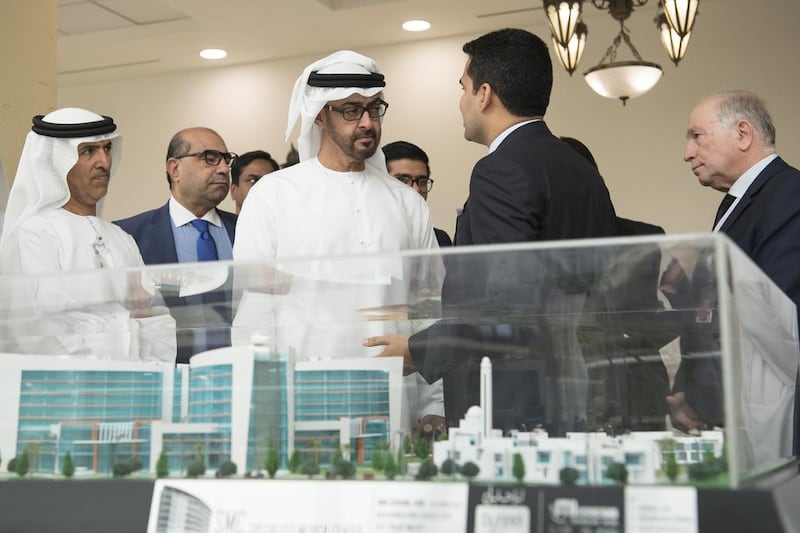ABU DHABI // Sheikh Mohammed bin Zayed on Wednesday ordered that a 20 per cent fee for Emiratis having private medical treatment be scrapped.
Sheikh Mohammed, Crown Prince of Abu Dhabi and Deputy Supreme Commander of the Armed Forces, announced the waiver at Burjeel Hospital.
He also ordered a specialist medical college and a healthcare city to be established to strengthen the emirate as a destination for medical tourism and services.
When the 20 per cent co-pay was revealed in June last year, Emiratis in long-term care expressed surprise.
The fee was waived in January for three long-term care centres in Abu Dhabi and Al Ain, which said they would take losses worth millions of dirhams after refusing to discharge patients who could not afford to pay.
Mohammed Al Hammadi, chief executive of United Eastern Medical Services, said yesterday’s announcement showed the leadership’s support for private health.
“It also gives patients a wider choice of healthcare providers and additional access to different service lines and healthcare facilities,” Mr Al Hammadi said.
His company includes Danat Al Emarat Hospital and HealthPlus Network of Specialty Centres.
Mr Al Hammadi said that after the waiver, United would invest Dh500 million in the second phase of Danat Al Emarat’s expansion, which will include 90 beds and new services, and new centres under HealthPlus Network.
Shamsheer Vayalil, chairman and managing director of VPS Healthcare, which runs Burjeel Hospital, said the move will “create more opportunities to provide innovative healthcare services”.
He said the company was “humbled” by Sheikh Mohammed’s visit on Wednesday morning, where he inspected the facilities and met patients to inquire about their well being.
Emiratis expressed relief at the news. Reem Saif’s son, 5, is autistic and was born with a hole in his heart and narrow trachea.
Ms Saif, 36, was provided with a nurse to help with her newborn, but when the fee came in she had to pay Dh40,000 a month.
“I had to let go of the nurse and get a maid to help me,” she said.
The maid had no medical experience and was not fit to care for a sick child, Ms Saif said. But after yesterday’s announcement, she said she would again hire a nurse.
“I always knew that our government would not do this to us, especially those who are in need.”
Salem Obaid found out in February that he had prostate cancer.
“I immediately chose to have the surgery in a hospital in the private sector and not the Government,” said Mr Obaid, 65. “I knew I had to pay 20 per cent, but my health was more important.”
The surgeon who performed his operation had worked at a government hospital before moving to the private sector.
“He was well known and I trusted him more than the doctors in the government sector,” Mr Obaid said.
He had his operation a week after being diagnosed and had to pay more than Dh20,000, which included hospital stay and follow-up care.
“My children help to pay for the surgery but many others who are my age and older don’t have children to support them and live off their pension,” he said. “As Emiratis we realise that there was a lot of abuse happening when we had complete coverage.
“People would go to the hospital for the silliest reasons, and the copay helped limit them, but it was very hard for people like me and others who had no other option than to go to the private sector.”
Emirati Ahmed Abdulla welcomed the decision, particularly because there are few government hospitals offering 24-hour care in rural areas and on the outskirts of the capital.
Mr Abdulla, who lives in Khalifa City A, said he had to rush his mother-in-law, 70, to a nearby private hospital during an emergency.
“There was nowhere near by for me to take her, and my mother-in-law is divorced and lives off the money she receives from social support,” he said.
Meanwhile, at yesterday’s visit, Sheikh Mohammed was also updated on the progress for Burjeel Medical City, a Dh1.2 billion hospital that will open next year and offer cancer treatment, advanced imaging, an emergency department and a rehabilitation centre.
salnuwais@thenational.ae






